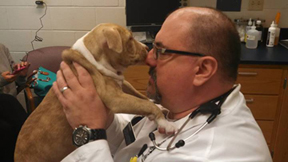
Photo courtesy of Dr. Tony Johnson
These are words any pet owner dreads hearing, especially on an emergency basis. For a pet owner, a trip to the veterinary emergency room can be a terrifying and frustrating experience: almost always unplanned...certainly unwelcome...and usually expensive.
How can you come through this stressful experience intact? How can you maximize the chances of your pet having a successful outcome and minimize your stress level?
Hopefully I can give you some pointers so this journey across the stormy seas of veterinary emergency care doesn't end up on the rocks.
The first thing to know is this: Vets are not the enemy. They are in that ER in the dark of night because they want to help your pet get better. Sure, there are dishonest veterinarians just like there are dishonest hairdressers and dishonest orchestra conductors. But the vast majority of animal docs are there because of a sincere desire to help.
The stress of a visit to the ER often comes from having to entrust your pet’s care, and possibly her life, to someone you have just met. This is a little bit like embarking on a perilous sea voyage with a captain you know nothing about. It can be a scary and unsettling prospect.
I think the easiest way to find a path to trust in these circumstances is to plan ahead, so you are armed and empowered with some information before the crisis hits. Emergencies don't often give you the benefit of warning, but if you can pre-screen your veterinary ER options you will be ahead of the game.
To this end, I recommend contacting your regular daytime veterinary clinic now, before there is an emergency, and see who they trust and how they run their ship. Talk to your trusted family veterinarian about the ER she sends patients to after they’re closed for the day, and consider talking to those ER folks beforehand, when all is well, to get a feel for them. Do they make you feel welcome? Secure? Is the hospital clean and well equipped? If so, then they are likely to be worthy of your trust.
During the emergency visit itself, try to get a feel for your doctor. Does she seem rushed and unfocused, or does she take the time to answer your questions? Does he seem confident, overconfident, or insecure? In order for a veterinarian to earn your trust, you should be able to have valid questions answered to your satisfaction. However, part of the responsibility falls on you, as a part of the team, to limit your questions to the important ones and avoid repetition. (We want you to be informed, but time is a precious commodity in the ER.) Bringing a notebook and writing down answers is another trick that savvy pet owners can use in the ER.
Try not to let the stress of the situation make you overly distrustful – you are just going to have to go into it with a little trust from the get-go, and you don’t want to take your stress out on the doctor or staff. It is better to give the hospital the benefit of the doubt rather than have an antagonistic relationship.
When it comes to making treatment decisions, the important words here are ‘options’ and ‘advice.’ A good doctor will give you realistic options for care, from the basic to the cutting edge, from the least expensive to the money-is-no-matter option, and advise you as to the risks and benefits of each as you plot a course. It is all about helping you come to a decision you are comfortable with that also meets the perceived medical needs of your pet.
If you have already found an ER vet that you trust, you will feel more comfortable that the options provided to you are the right ones. If they don’t feel right to you, ask if there are any other options to explore.
It is a tall order to be asked to trust your beloved pet's life and health to someone you just met, but with a little luck and knowledge, you can chart a course for a good outcome.